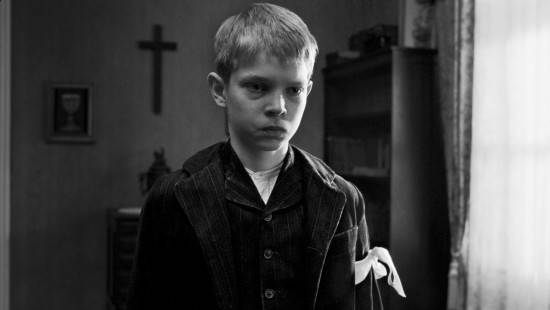The White Ribbon presents a simple premise: the small village of Eichwald in Germany, pre-World War I, experiences a series of bizarre accidents. It all starts when the village doctor trips while riding his horse back to his home and is badly injured. Upon further investigation, it is discovered that this was no accident; in fact, a wire had been strung between two trees at the entrance of the doctor’s property. Someone knew he would be passing through and wanted him to trip.
As the story continues, more strange incidents occur. A woman falls to her death. A barn burns. A pair of children disappears. When they are found, they have been badly beaten. A letter found with one of the beaten boys says that children are being punished for the sins of the parents and will continue to be for generations to come. Whether this is a threat or a fact of life is open for debate.
These mysterious events weigh heavily on the villagers. The village baron (Ulrich Tukur) is desperate for answers. So is the village schoolteacher (Christian Friedel), who narrates the film from later in his life. He suspects that some of the children know more than they let on and, indeed, the children seem to be behaving strangely.
The irony in all of this is while these accidents generate so much anxiety for the village, the portions of the film between these segments are the most unsettling for the viewer. Not only in anticipation of what may happen next, but in the way the film steps back from these events and focuses on the fissures within the community. There are many scenes in this film that focus on the relationships of the families independent of the entire “accident narrative.” Many of these scenes, particularly one concerning the doctor and his midwife, are the most powerful in the film.

As the film meanders along through the village, much is learned about the relationships between the parents and children. These are perhaps the most fractured relationships of all. In response to fear of the unknown, the parents impose strict punishments on their children. Some are brutal and heard even behind closed doors. Others are fairly innocuous, such as the eponymous white ribbon. When they have been bad, the children wear a white ribbon — white, they are told, to remind them of their innocence. It is curious symbolism. When the ribbons are removed, are the children then free to forget their innocence? May the ribbons serve to remind the parents of their lost innocence as well?
Director Michael Haneke (Caché, Funny Games) said in an interview that The White Ribbon is about “the origin of every type of terrorism, be it of political or religious nature,” and indeed, the film demonstrates how fear can bring out the worst in a community. As the film progresses, it becomes clear that who is committing these acts is insignificant. What is more significant is how a strained social climate can breed violence, which in turns strains the community even more. It is a question not of “who”, but why.
There is some incredible acting in The White Ribbon. Every adult performance is nuanced and natural; the actors fit comfortably into their roles. The children are particularly impressive, especially the pastor’s oldest children Klara and Martin (Maria-Victoria Dragus and Leonard Proxauf), and Christian Berger’s Academy Award nominated cinematography is stark but effective. If The White Ribbon is viewed not as mystery but as a study of why violence begets violence, it can be an effective movie that sticks with you and may even be worth a second viewing.
The White Ribbon is playing exclusively at the C-U Art Theater. Check out their website for show times. Trailer below:








